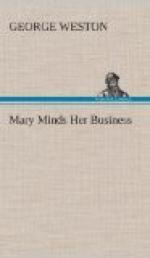“Can you read it?” she asked.
Miss Cordelia bent over, and as a new angle of light struck the tray, the words became as legible as though they had just been written.
“I thought I knew the writing,” whispered Miss Cordelia, and lowering her voice until her sister had to hang breathless upon the movement of her lips, she added “Oh, Patty ... We all thought he was dead ... No wonder it killed poor Josiah ...”
Their arms went around each other. Their glances met.
“I know,” whispered Miss Patty, her lips suddenly gone dry, “....It was from Paul...!”
CHAPTER XI
For the first few months after her father’s death, Mary’s dreams seemed to fade into mist.
Between her and Josiah a bond of love had existed, stronger than either had suspected—and now that he was gone the world seemed unaccountably empty—and unaccountably cruel. As her father had gone, so must Aunt Cordelia and Aunt Patty some day surely go ... Yes, and even Mary herself must just as surely follow.
The immemorial doubt assailed her—that doubt which begins in helplessness and ends in despair. “What’s the use?” she asked herself. “We plan and work so hard—like children making things in the sand—and then Death comes along with a big wave and flattens everything out ... like that ...”
But gradually her sense of balance began to return. One day she stood on the brink of the hill looking at the great factory below, and a calmer, surer feeling slowly swept over her.
“That’s it,” she thought. “The real things of life go on, no matter who dies, just as though nothing had happened. Take the first Josiah Spencer and look down there what he left behind him. Why, you might even say that he was alive today! And see what Washington left behind him—and Fulton, who invented the steamboat—and Morse who invented the telegraph. So it’s silly to say ‘What’s the use?’ Suppose Columbus had said it—or any of the others who have done great things in the world—”
It slowly came to her then, her doubts still lingering, how many are called, how few are chosen.
“That’s the trouble,” she said. “We can’t all be Washingtons. We can’t all do great things. And yet—an awful lot of people had to live so that Washington could be born when he was....
“His parents: that was two. And his grand-parents: he must have had four. And his great grand-parents: eight of them....
“Why, it’s like the problem of the horse-shoe nails,” she continued in growing excitement. “In twenty-eight generations there must have been millions and millions of people who lived—just so George Washington could be born one day at Mt. Vernon—and grow up to make America free! Yes, and every one of them was just as necessary as Washington himself, because if it hadn’t been for every single one of them—we would never have had him!”




